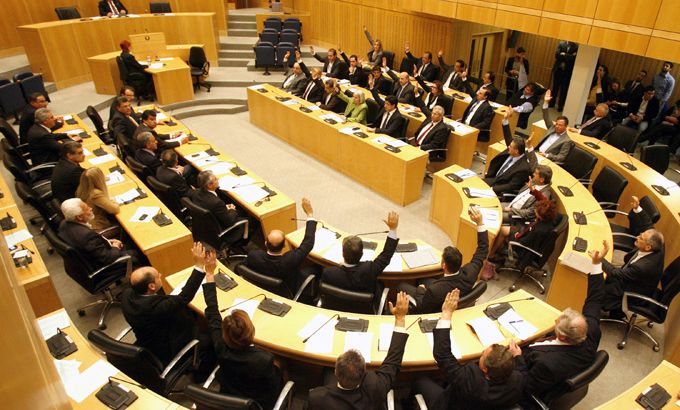Cypriot MPs reject tax on bank deposits
Parliament overwhelmingly rejects international lenders’ terms with zero votes in favour, 36 against and 19 abstentions.

The Cypriot parliament has rejected a deeply unpopular tax on bank deposits, throwing into doubt an international bailout for the troubled euro zone member needed to avert default and a banking collapse.
“The bill has been rejected,” said house speaker Yiannakis Omirou, as thousands of protesters outside the parliament building in Nicosia exploded in joy.
Keep reading
list of 4 itemsUS imposes new sanctions on Iran after attack on Israel
A flash flood and a quiet sale highlight India’s Sikkim’s hydro problems
Why is Germany maintaining economic ties with China?
The 56-seat parliament voted by 36 votes against, 19 abstentions and with zero votes in favour to bury the bill, a condition of a 10 billion euro ($13 billion) European Union bailout for the Mediterranean island. One deputy was absent.
Tuesday’s vote, on the controversial bailout deal that includes levy on bank accounts, was denounced by almost 400 protesters outside the building who were angry about the bailout conditions.
Cyprus will now have to come up with an alternative plan to raise the money. If it does not, it will not qualify for external rescue loans, the country’s banks face collapse and the country could go bankrupt.
Local media said the government would now try to renegotiate the terms of the deal with the troika of lenders, and at the same time seek other ways of making up a 5.8 billion-euro ($7.47 billion) shortfall.
“Nobody knows what’s going to happen next, because now we are moving into unchartered territory,” said Stavros Zenios, professor of finance at the University of Cyprus.
Stavros said that the first step to contain the immediate banking crisis, and to avoid a bank-run, should be “some kind of currency control”, and an alternative plan, which should involve “some kind of debt restructuring”.
He added that the worst case scenario would be if the European Central Bank declares one of the banks as insolvent.
“If they cut off the funding then the bank becomes bankrupt and goes into resolution. Depositors will lose their security deposits, but the concern is [it] will have repercussions on the country.”
Harsh terms
The eurozone wants the Cypriot government to raise 5.8bn euros as part of negotiations for a 10bn euro bailout – the first time that European and International Monetary Fund agreed to force ordinary depositors to help pay for the bailout, in the Eurozone crisis.
“We believe that a lot of damage has been done to the system because Cyprus is a regional business centre. One of its foundations is that it was a place of trust, safety and security,” Antonis Paschalidis, former Cypriot commerce minister, told Al Jazeera.
“The Eurogroup actually attacks these foundations of the deposits of foreign investors, Cypriots, rich people, poor people, and business.”
The president was expected to hold telephone talks with Russian President Vladimir Putin, who has described the tax as “unfair, unprofessional and dangerous.
Analysts have said that Russians, who own approximately half of the 60-70bn euros held in Cyprus’ banks, could end up withdrawing all their deposits.
Contrary to earlier reports, Michael Sarris, the country’s finance minister, has said that there is “no truth” to reports of him offering his resignation to President Anastasiades.